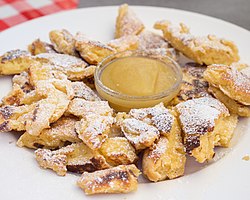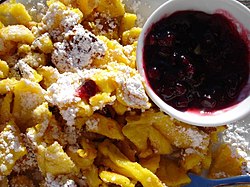 Kaiserschmarrn with apple sauce | |
| Type | Pancake |
|---|---|
| Place of origin | Austria-Hungary |
| Main ingredients | Flour, eggs, sugar, milk, butter |

Kaiserschmarrn (German pronunciation: [ˈkaɪzɐˌʃmaʁn] ⓘ) or Kaiserschmarren (German: [ˈkaɪzɐˌʃmaʁən] ⓘ;[1] 'Emperor's Mess')[2] is a lightly sweetened pancake that takes its name from the Austrian emperor (Kaiser) Franz Joseph I, who was fond of this fluffy shredded pancake. It is served as a dessert or as a light lunch alongside apple sauce and contains raisins or dried red currants.
Kaiserschmarrn is a popular meal or dessert in Austria, Bavaria, and many parts of the former Austro-Hungarian empire, e.g. northern Italy, Hungary, Slovenia, Czech Republic, northern Croatia and western Romania, which usually use the name as a loan word or translations of it. In Slovenia, it is called cesarski praženec or šmorn. Its Hungarian name is császármorzsa [3][4] or smarni;[4] its Czech name is (Císařský) trhanec or kajzršmorn. In Slovak it is called Cisársky trhanec; Its Romanian name is șmoră.
Etymology
[edit]The name Kaiserschmarrn is a compound of the words Kaiser ('emperor') and Schmarren (a scrambled or shredded dish). Schmarren is also a colloquialism used in Austrian and Bavarian to mean 'trifle, mishmash, mess, rubbish, nonsense'. The word Schmarren may be related to scharren ('to scrape') and schmieren ('to smear' [see schmear]).[citation needed]
Description
[edit]

Kaiserschmarrn is a light, caramelized pancake made from a sweet batter using flour, eggs, sugar, salt, and milk, fried in butter. Kaiserschmarrn can be prepared in different ways. When making Kaiserschmarrn the egg whites are usually separated from the yolk and beaten until stiff; then the flour and the yolks are mixed with sugar, and the other ingredients are added, including: nuts, cherries, plums, apple jam, or small pieces of apple, or caramelized raisins and slivered almonds. The latter ingredients (nuts, cherries, plums, apple jam, or small pieces of apple, or caramelized raisins and chopped almonds) are not part of the original recipe, but additions made by cooks based on their personal preferences. The original recipe only includes rum-soaked raisins.
The pancake is shredded using two forks during frying and usually sprinkled with powdered sugar, then served hot with apple or plum sauce or various fruit compotes, including plum, lingonberry, strawberry, or apple. Kaiserschmarrn is eaten like a dessert, or it can also be eaten for lunch at tourist places like mountainside restaurants and taverns in the Austrian Alps, as a filling meal.
Traditionally, Kaiserschmarrn is accompanied with Zwetschgenröster, a fruit compote made of plums.
Varieties
[edit]A number of varieties exist, including Erdäpfelschmarrn (with potatoes), Äpfelschmarrn (with apples) or Kirschschmarren (with cherries), usually prepared on an open fireplace of a so-called Rauchkuchl.
History
[edit]
It is generally agreed[citation needed] that the dish was first prepared for the Austrian Emperor Francis Joseph I (1830–1916). There are several stories. One apocryphal story involves the Emperor and his wife, Elisabeth of Bavaria, of the House of Wittelsbach. Obsessed with maintaining a minimal waistline, Empress Elisabeth directed the royal chef to prepare only light desserts for her, much to the dismay and annoyance of her notoriously austere husband. Upon being presented with the chef's confection, she found it too rich and refused to eat it. The exasperated Francis Joseph quipped, "Now let me see what 'Schmarren' our chef has cooked up." It met his approval as he finished his and even his wife's serving.[2]
References
[edit]- ^ Sheraton, Mimi (2002). The German Cookbook. New York: Random House. ISBN 978-039440138-6.
- ^ a b Meehan, Monica; Baich, Maria von (2011). Tante Hertha's Viennese Kitchen. London, Cape Town, Sydney, Auckland: New Holland Publishers (UK) Ltd. p. 148. ISBN 978-184773726-7.
- ^ June Meyers Authentic Hungarian Heirloom Recipes Cookbook
- ^ a b "smarni | Magyar etimológiai szótár". www.arcanum.com (in Hungarian). Retrieved 2023-09-20.